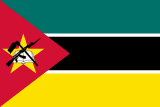
Mozambique - October 2024
Ruling party declared winner in disputed general election

On 9 October, Mozambique held general elections to select the President and members of the unicameral Assembly of the Republic and the provincial assemblies. According to the provisional results announced by the National Elections Commission (Comissão Nacional de Eleições, CNE) on 24 October, the ruling Mozambique Liberation Front (Frente de Libertação de Moçambique, FRELIMO) won 195 (78.0 per cent) of the 250 Assembly seats, followed by the Optimist Party for the Development of Mozambique (Partido Otimista pelo Desenvolvimento de Moçambique, PODEMOS) (31 seats; 12.4 per cent), the Mozambique National Resistance (Resistência Nacional Moçambicana, RENAMO) (20 seats; 8.0 per cent) and and the Democratic Movement of Mozambique (Movimento Democrático de Moçambique, MDM) (4 seats; 1.6 per cent). The presidential election was won by FRELIMO’s candidate, Daniel Chapo who received 70.7 per cent of the vote. The runner up, with 20.3 per cent, was Venâncio Mondlane, an independent candidate supported by PODEMOS. Alleging electoral fraud, PODEMOS and other political parties appealed the general election results to the Constitutional Council (Conselho Constitucional, CC), the body charged with validating the results. Women candidates occupied the top spot in 30 per cent of the party lists for the parliamentary contests, but there were no women among the four presidential candidates. The CNE reported presidential election turnout to be 43.5 per cent (down from 51.8 in 2019) and 43.9 per cent in the parliamentary contest (down from 51.4 in 2019). International observers and analysts reported evidence of ballot stuffing, counting and tabulation irregularities and an inflated voters’ roll.
Sources: Comissão Nacional de Eleições, Mozambique Political Process Bulletin, Club of Mozambique, Conselho Constitucional, European Union (1), European Union (2)
Post-election violence escalates in Mozambique amid assassinations and fraud claims
In the wake of Mozambique’s disputed 9 October poll, protesters clashed with police in deadly confrontations, as thousands took to the streets over alleged election fraud. On 16 October, presidential candidate Venâncio Mondlane called for a nationwide shutdown on 21st of the month, as allegations of serious election irregularities emerged from election observers. Tensions escalated in the wake of the apparent assassination of Mondlane’s elections lawyer, Elvino Dias, and a senior official from the Optimist Party for the Development of Mozambique (Partido Otimista pelo Desenvolvimento de Moçambique, PODEMOS), Paulo Gwambe, who were shot dead in the capital Maputo on 19 October. The protests on 21 October (and those which followed on the 24th and 25th) were met with a heavy response from the police, who deployed armoured vehicles and fired tear gas and live ammunition to disperse the protesters. Some protesters threw rocks at the police, barricaded streets with burning tires and burned down public buildings. The authorities also shut down the internet. By 26 October, the police had killed at least 11 people.
Sources: International Crisis Group, The Africa Report, British Broadcasting Corporation, Africa Confidential, Human Rights Watch, Mozambique Political Process Bulletin
Voter turnout in presidential and parliamentary elections falls to two-decade low
Voter turnout in Mozambique’s presidential and parliamentary elections fell to a two-decade low. According to data from the National Election Commission (Comissão Nacional de Eleições, CNE), just 43.5 per cent of registered voters cast their ballot in the presidential election and the figure was only marginally higher for the parliamentary poll (43.9 per cent). Compared to the previous general election in 2019 (when turnout for the presidential election was 51.8 per cent and for the parliamentary elections it was 51.4 per cent), these represent declines of 8.3 and 7.5 percentage points, respectively. Analysts have ascribed the low turnout to various factors, including public distrust of electoral processes and institutions, the inflation of the voter’s roll with non-existent ‘ghost’ voters and, in the case of Cabo Delgado, the ongoing insecurity in the province.
Sources: Comissão Nacional de Eleições, International IDEA, Club of Mozambique, International Crisis Group, CIVICUS, Mozambique Political Process Bulletin, Al Jazeera, Centro de Integridade Pública